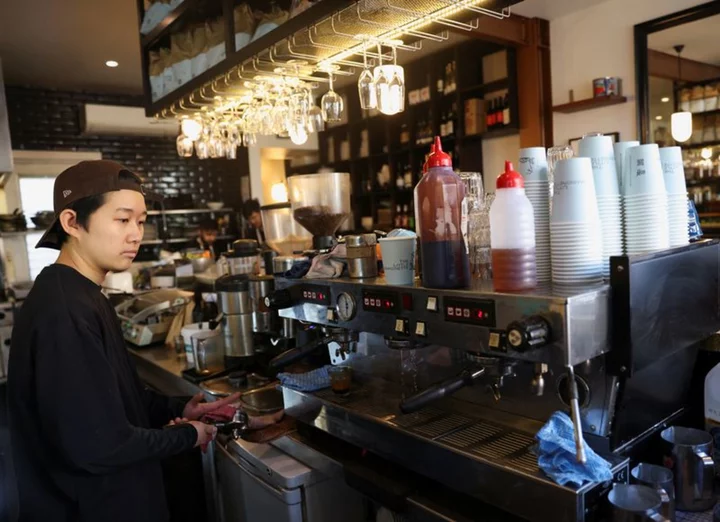By Byron Kaye and Lewis Jackson
SYDNEY The cost of serving up a sandwich with a cup of coffee has hit the roof across Australia's vaunted cafes, squeezing profits and forcing a wave of closures for those that managed to survive the COVID slump.
The A$10 billion ($6.6 billion) Australian cafe industry, the world's biggest outside Europe per capita, is shaping as an early, visible casualty of a perfect storm of rising utility bills, produce costs, wages and rents plus a slowdown in discretionary spending brought on by interest rate hikes, say economists and people in the industry.
A Reuters analysis of popular cafe orders found the cost to commercially produce a steak sandwich, including all overheads from electricity to cuts of beef, rose by one-sixth in the past two years, while discretionary spending flatlined, effectively wiping out the 10% profit margin typical of the industry.
The cost to make a flat white, one of the most popular Australian coffee orders, jumped by nearly one-fifth.
The result is smaller profits, a shrinking pool of regular customers and business owners heading for the exit.
"The cost of living started to bite, especially on people who used to come in for a daily meal," said Jack Hanna, a former World Latte Champion who closed Goodsline Cafe in downtown Sydney last month, two years after opening to rave reviews and spending roughly A$1.5 million on the fitout.
"People are just not willing to spend money on discretionary items when the supermarket also costs quite a lot. We had to increase our prices and pay staff a living wage," Hanna added.
Damian Krigstein, a nearby cafe owner who helped Hanna pack up Goodsline, said his business, Bar Zini, plans to convert to takeaway to cut costs.
"When you look around Sydney and you look at so many businesses for lease, institutions from when you were a child just completely gone now, people losing their livelihoods - it's scary times," said Krigstein.
Before COVID-19, hospitality venues were about one-third of Australian small businesses advertised for sale. Now there are more businesses up for sale, and the percentage of hospitality venues is closer to half, with asking prices being discounted by up to 50% of historic market values, say selling agents.
"Many of these hospitality vendors are simply exhausted after surviving COVID," said Peter Meredith, a broker at SBS Business Brokers. "They are relieved to get out of leases."
About one-sixth of cafes advertised for sale now close down before finding a buyer.
"People are starting to panic with increased electricity, wages, rent," said Guy Cooper, a director at Link Business Sales Australasia, which has more than 400 hospitality businesses for sale nationwide.
Australian Securities and Investments Commission data showed business insolvencies in May at the highest monthly rate in eight years as COVID-related government protections expire.
So far, the insolvencies have been dominated by construction firms, but hospitality is expected to overtake it in the next year, says CreditorWatch, a credit reporting agency.
CreditorWatch CEO Patrick Coghlan said while a business-to-business organisation can raise prices 10% or 20%, that's not possible in hospitality.
"You can't charge A$30 for a bacon and egg roll. There's no real respite."
COST PRESSURES
Driving inflation, energy prices have jumped as much as 30% after the Ukraine war disrupted coal and gas markets, while wholesale produce costs have surged after years of extreme weather events.
With unemployment near the lowest on record, wages are rising, too, including for hospitality staff.
In addition, the pandemic increased cafes' reliance on third-party delivery platforms which take a cut of revenue.
To combat inflation, Australia's central bank has raised interest rates by 400 basis points in 14 months, the fastest tightening in a generation. It paused in July but warned it may resume hiking if inflation, still running at 7%, fails to slow.
As rising utility bills and a collapse of consumer spending make it impossible to make rent, David Cox, a cafe owner from Sydney's suburbs, said he is selling, with expectations he will lose at least 60% of the A$170,000 he spent buying and refurbishing the business two years ago.
"The mortgage rates have done a lot of damage," said Cox, 59, who recently laid off his three casual staff when daily takings dipped from A$1,000 last year to A$200. Cox's monthly energy bill is about to jump from A$3,000 to A$3,800, nearly all his revenue.
"Some of my regulars I used to have will still come and get coffee and say, 'We had to bring lunch. We just brought it in from home,'" he said.
($1 = 1.5103 Australian dollars)
(Reporting by Byron Kaye and Lewis Jackson in Sydney; Editing by Praveen Menon and Sonali Paul)

